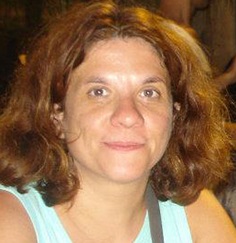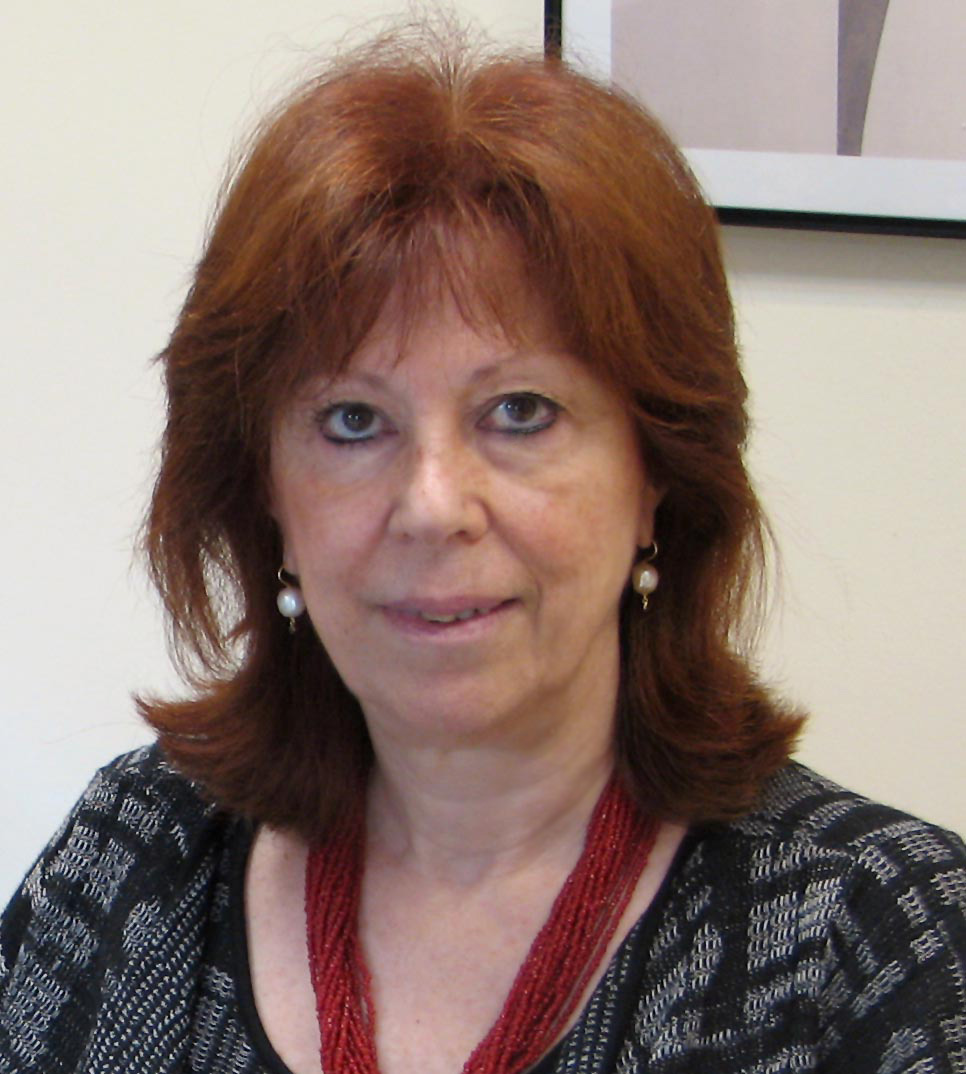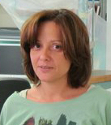
Maria Gaitanou’s group focus on the molecular signaling mechanisms involved in the development and proper functioning of CNS and its disorders. Especially, the group aims to study: 1) Neurodevelopment and neural stem cell biology, by identifying key molecules controlling cell cycle progression/exit and neuronal differentiation. 2) Neurosignaling, by focusing on novel cellular and molecular signaling pathways that underlie neurogenesis and the pathophysiology of CNS. 3) Gene therapy approaches, aiming at the regeneration-repair of injured CNS/spinal cord using stem cells in cell replacement therapies and lentiviruses for the delivery of therapeutic genes. 4) Neurodegeneration and neuroregeneration, by studying DYRKI kinase family, which constitute a novel pharmacological target for the treatment of age-related neurodegenerative diseases. Main goal is to develop novel therapeutics, using small molecules and miRNAs combined to nanoparticle delivery systems, and nanotechnology-based immuno-medicines, as novel combinatorial therapeutic approaches for the treatment of neurodegenerative diseases.
Neurodevelopment: Signaling Pathways Controlling Cell Cycle Progression/Exit and Differentiation of Neural Stem Cells
Cend1 is a neuronal-lineage specific modulator, inducing cell cycle exit and neuronal differentiation
We have previously documented the pivotal role of BM88/Cend1 in coordination of cell cycle exit via p53/cyclin D1/pRb signaling pathway and differentiation of neural stem cells via Notch signaling downregulation and activation of proneural genes. We identified the scaffolding protein RanBPM as a binding partner of BM88/Cend1 and Mirk/Dyrk1B kinase and showed that functional interactions between Cend1, RanBPM and Dyrk1B proteins affect the balance between cellular proliferation and neuronal differentiation in Neuro2A cells, suggesting that this tripartite interaction may also play a similar role in cell cycle progression/exit and differentiation in neural stem/precursor cells.
Members involved
Konstantinos Tsioras, Florentia Papastefanaki, Rebecca Matsas, Maria Gaitanou (PI).
Relevant publications
Tsioras K, Papastefanaki F, Politis PK, Matsas R, Gaitanou M. Functional Interactions between BM88/Cend1, Ran-binding protein M and Dyrk1B kinase affect cyclin D1 levels and cell cycle progression/exit in mouse neuroblastoma cells. PLoS One. 2013 Nov 28;8(11): e82172. doi: 10.1371/journal.pone.0082172. PMID: 24312406; PMCID: PMC3842983.
Gaitanou M, Segklia K, Matsas R. Cend1, a Story with Many Tales: From Regulation of Cell Cycle Progression/Exit of Neural Stem Cells to Brain Structure and Function. Stem Cells Int. 2019 May 2;2019: 2054783. doi: 10.1155/2019/2054783. PMID: 31191667; PMCID: PMC6525816.
Mirk/Dyrk1B kinase induces cell cycle exit and neuronal differentiation in vitro and in vivo and marks hippocampal adult neurogenesis
We have previously demonstrated that Dyrk1B is expressed in mouse brain and in cultured primary cortical neurons, while it promotes in vitro cell cycle exit and neuronal differentiation in Neuro 2A cells. Dyrk1B is expressed by cycling neuronal progenitors, as well as by differentiated motor neurons in the embryonic chick and mouse spinal cord. Dyrk1B protein expression is decreased during chick and mouse CNS development. Moreover, Dyrk1B is ubiquitously expressed in the adult mouse cortex and more intensely in the adult hippocampus, especially in the neurogenic region of dentate gyrus (DG), where Dyrk1B is expressed both by neuronal progenitors (type 1, 2a, 2b cells), by immature (NeuN+/DCX+) and mature post-mitotic neurons (Calbidin+), suggesting a major role for Dyrk1B kinase both in embryonic and adult neurogenesis. Dyrk1B function in embryonic and adult neurogenesis is under investigation.
Members involved
Nikolaos Kokkorakis, Rebecca Matsas, Maria Gaitanou (PI).
Relevant publication
Kokkorakis N, Gaitanou M. Minibrain-related kinase/dual-specificity tyrosine- regulated kinase 1B implication in stem/cancer stem cells biology. World J Stem Cells. 2020 Dec 26;12(12):1553-1575. doi: 10.4252/wjsc. v12.i12.1553. PMID: 33505600; PMCID: PMC7789127.
Neurodevelopment: Signaling Pathways Controlling Motor Neuron Development in Health and Disease
Mirk/Dyrk1B kinase regulates the generation of spinal motor neurons and their columnar organization in the developing chick spinal cord
Spinal motor neurons (SpMNs) control diverse motor tasks including respiration, posture and locomotion. SpMNs are first disrupted by neurodegenerative diseases such as amyotrophic lateral sclerosis and spinal muscular atrophy. SpMNs are organized normally into distinct anatomical columns extending along the rostro-caudal axis of spinal cord, called motor columns. Four main columns are described: the median motor column (MMC), the lateral motor column (LMC), the hypaxial motor column (HMC), and the preganglionic column (PGC). LMC MNs subdivide at the brachial and lumbar level of spinal cord into medial LMC (LMCm) and lateral LMC (LMCl) columns which innervate ventral and dorsal muscle limb respectively. We study the cross-talk of Mirk/Dyrk1B kinase with various signaling pathways in the generation of spinal motor neurons and their columnar organization by applying in ovo gain-and-loss-of-function approaches at E2 and analyzed at E4 and E6 stages of the developing chick spinal cord and by applying an in vitro differentiation protocol of mouse embryonic stem cells (mESCs) towards to different spinal motor neurons subtypes.
Members involved
Nikolaos Kokkorakis, Anna-Vasiliki Nalbadi, Rebecca Matsas, Maria Gaitanou (PI).
Neurodegeneration and Neuroregeneration Mechanisms
Neurodegeneration and neuroregeneration mechanisms, by studying DYRKI kinase family, which constitute a novel pharmacological target for the treatment of age-related neurodegenerative diseases, such as Alzheimer’s disease and related tauopathies.
Role of Minibrain/DYRK1B kinase in the development of Tau pathology
Members involved
Georgia Dimitriou, Nikolaos Kokkorakis, Rebecca Matsas, Maria Gaitanou (PI).
2021-2023
High Technology Infrastructure for Preclinical Studies and Provision of Specialized Services for Infectious and Neurodegenerative Diseases (Ref: MIS 5066768) implemented under the Priority Axis «Strengthening the Mechanisms and Investments of SMEs of the Attica Region in Research and Innovation» funded by the Operational Program «Attiki 2014-2020» (NSFR 2014-2020), and co-financed by the Greek State and the European Regional Development Fund. Total budget: 1.000.000 €, for the period July. 2021 – Dec. 2023. Co-ordinated by the Hellenic Pasteur Institute (Dr E. Karagkouni). (M. Gaitanou Participation as Team Member).
Hellenic Foundation for Research and Innovation (HFRI). Development of a multi-parametric morpho-functional platform to uncover disease mechanisms and druggable targets in patient-derived cells: study of neuron-glia dynamics in α-synuclein mediated pathologies. Acronym: DiseasePHENOTarget 2021-2023, Total budget: 1.000.000€, PI: Rebecca Matsas. (M. Gaitanou Participation as Team Member).
2020-2023
Hellenic Ministry of Development and Investment, General Secretariat of Science and Innovation (GGEK) – Action for the Generation of a «National Network for Research into Genetic Neurodegenerative Diseases», Acronym: ΕΔΙΑΝ, under the action «National Infrastructure Research Networks in Areas of Precision Medicine and Climate Change» (Ref: 2018ΣΕ01300001). Duration 36 months (19/05/2020-18/05/2023). Total action budget 2.100.000,00 €; Hellenic Institute Pasteur participation coordinated by Rebecca Matsas, 150.000 €. Participant M. Gaitanou budget: 22.500 €.
EPAnEK, 2014-2020, Τ6ΥΒΠ-00246, MIS 5055881. Effectiveness of terrestrial and marine plant extracts for the prevention and treatment of parasite infections (Microcotyle spp, Myxosporea) and of myxobacteriosis in cultured Sea bream (Sparus aurata L.). Acronym: AltMedSea. Duration: 2020-2023, Total budget: 399.973 €, HPI budget: 112.000 €, PI: Karagouni E. Partners: University of Thessaly, ELGO/Dimitra, SKALOMA SA. (M. Gaitanou Participation as Team Member).
2018–2021
Operational Program Competitiveness, Entrepreneurship and Innovation, European Union and Greek national funds. Biomarkers in autoimmune neurological diseases. Acronym: NeuroMarkers. MIS 5032815, 2018-2021. Total budget for HPI 340.440 €, Total budget: 680.000 €, Coordinator: P. Zisimopoulou, Partners: Tzartos Neurodiagnostics. Participant M. Gaitanou budget: 35.000 €.
2017–2019
Greek General Secretariat of Science and Technology (GGET) – Institutional Project entitled “Infectious, autoimmune and neurodegenerative diseases: study of the pathogenic mechanisms and development of diagnostic, prognostic and therapeutic strategies” (Ref: MIS 5002486), acronym “KRIPIS II”. implemented under the Action “Strategic Development of the Research & Technology Sector” of the Operational Program “Competitiveness, Entrepreneurship and Innovation” (EPAnEK), and co-financed by the Hellenic State and the European Regional Development Fund. Duration 2017–2019. Co-ordinated by the Hellenic Pasteur Institute (Dr E. Karagkouni). Total Institute Budget: 550.000 €. Participant M. Gaitanou budget: 22.900 €.
2013–2015
Secretariat for Research and Technology (GRST)-European Social Fund (ESF) and the Greek State, of the Operational Strategic Reference Framework, NSFR 2007–2013. Institutional Project entitled: “Infectious and neurodegenerative diseases in the 21st century: study of basic mechanisms for the development of the translational research and cutting edge technologies aiming to effective diagnosis prevention and therapy”. (Ref: MIS 450498), acronym “KRIPIS I”. Duration 2013–2015. Co-ordinated by the Hellenic Pasteur Institute (Dr E. Karagkouni). Total Institute Budget: 1.500.000 €. Participant M. Gaitanou budget: 68.180 €.
Maria Gaitanou’s group uses molecular, biochemical techniques combined to histochemistry, immunocytochemistry and bioimaging by using stem cells, cellular and animal models of human diseases. Molecular biology and CRISPR/Cas9 technology combined to genetics and epigenetics, and multi–omics technologies. Moreover, ex vivo and in vivo gene therapy performed by using several viral vectors. The research is carried out in close collaboration with the Institute’s horizontal platforms, particularly the Department of Animal Models for Medical Research (add link to ΤΖΠΒΕ), the Human Stem Cells Unit (add link to Human stem cell Unit), and the Imaging Unit equipped with flow cytometry, confocal, time lapse and 2-photon imaging systems (add link to Imaging Unit), as well as expert external collaborators in the areas of proteomics, ChIP Seq and RNA Seq technology.
Maria Gaitanou’s group is actively involved in communication and dissemination at National and International levels by participation in the following scientific societies and activities:
- Hellenic Society for Neuroscience (HSFN)
- Hellenic Society for Biochemistry and Molecular Biology (HSBMB)
- Hellenic Society for Biological Science (EEBE)
- Hellenic Society of Gene Therapy and Regenerative Medicine
- Federation of European Neuroscience Societies (FENS)
- International Brain Research Organization (IBRO)
- Federation of European Biochemical Societies (FEBS)
- Theocharakis Foundation: Coffee with the researchers of the Hellenic Pasteur Institute, (Café Merlin), 5 February 2017, Title: “Cell cycle and neuronal differentiation, two opposing processes in the generation of the Central Nervous System”
- National Documentation Centre, 20 October 2015, Participation in the Speaker’s panel of Seminar: "Preparing Young Researchers for Open Science" (http://helios-eie.ekt.gr/EIE/handle/10442/15008).
- European Researchers’ Night /Athens Science Festival 2015-2017
- Public Lecture organized by Hellenic Society for Neuroscience (HSFN), in the Naval Military Hospital- Salamis Naval Base, 17 March 2012. Title of the talk: "The use of stem cells in cell therapy of neurodegenerative diseases" (Invited speaker)
Postdoctoral Researchers
- Nikolaos Kokkorakis (2024-2025)
PhD students (PhD thesis)
- Konstantinos Tsioras (2007-2013)
- Nikolaos Kokkorakis (2017-2024)
- Georgia Dimitriou (2022-to date)
MSc students (MSc thesis)
- Georgia Gaki (2013-2014)
- Katerina Douka (2014-2015)
- Nikolaos Kokkorakis (2015-2016)
- Stathourou Maria (2021-2022)
- Anna-Vasiliki Nalbadi (2022-2023)
MSc Students, Internships
- Antonakou Vasiliki (2018)
- Papadopoulou Anastasia (2018)
- Karagianni Evangelia (2019)
- Masouti Evangelia (2019)
- Stathourou Maria (2020)
- Ellinas George (2021)
- Anna-Vasiliki Nalbadi (2022)
BSc students (Diploma thesis)
- Dimitra-Danai Stamatiou (2025-2026)
- Katerina-Dimitra Tsimpouki (2024-2025)
- Evangelia Papoutsi (2024-2025)
- Konstantinos Tsioras (2006-2007)
- Anthi Trasta (2008-2009)
BSc Students, Internships
- Sophia Diplari (2022)





Panagiotis Politis, Researcher at Associate Professor Level, Biomedical Research Foundation of the Academy of Athens
Spyros Efthimiopoulos, Professor, National and Kapodistrian University of Athens.
